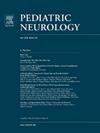Adjuvant High-Dose Erythropoietin With Delayed Therapeutic Hypothermia in Neonatal Hypoxic-Ischemic Encephalopathy
IF 3.2
3区 医学
Q2 CLINICAL NEUROLOGY
引用次数: 0
Abstract
Background
To evaluate the benefits of high-dose erythropoietin (EPO) combined with therapeutic hypothermia (TH) on brain magnetic resonance imaging (MRI) scores and neurodevelopmental outcomes in neonates with moderate to severe hypoxic-ischemic-ecephalopathy (HIE), especially in neonates who received TH between six to 12 hours of birth.
Methods
This prospective, single-blind, randomized, placebo-controlled trial enrolled term newborns with moderate to severe HIE admitted to neonatal intensive care unit between April 2018 and April 2022. Hypothermia was started within 12 hours of birth. Infants were randomized to receive EPO 1000 U/kg or an equal volume of normal saline (placebo) on days 1, 2, 3, 5, and 7 of age in combination with hypothermia.
Results
Fifty-seven neonates with moderate to severe HIE were recruited; 10 were excluded. Forty-seven patients were included: 32 received TH within six hours (group I) and in 15 TH was started within six to 12 hours of birth (group II). The clinical characteristics of mothers and infants, maternal complications, and resuscitations performed during the perinatal period showed no statistical differences between EPO group and placebo groups I and II. The MRI scores and brain injury patterns did not differ between the EPO and placebo groups. There is no statistical significance in either group's seizure and severe electroencephalography background (initial and after rewarming) between EPO and placebo in each group. There were no differences in developmental outcomes (abnormal Denver II > 2 area, Gross Motor Function Classification Score >1); Bayley Scales of Infant and Toddler Development, third edition (BSID-III) score (cognitive, language, and motor); or disability (hearing impairment and impaired vision) between the EPO and placebo groups I and II at 12 and 18 months.
Conclusions
Among term infants with moderate to severe HIE, TH with EPO administration, compared with TH alone, did not reduce brain injury on MRI or the risk of neurological sequelae both in patients who received TH within six hours and in those who received TH later (six to 12 hours). Further studies on the benefit of EPO injection alone or before TH in situations where TH cannot be performed are required.
新生儿缺氧缺血性脑病患者辅助大剂量促红细胞生成素和延迟治疗性低温疗法
背景评估高剂量促红细胞生成素(EPO)联合治疗性低温(TH)对中度至重度缺氧缺血性脑病(HIE)新生儿脑磁共振成像(MRI)评分和神经发育结局的益处,尤其是出生后6至12小时内接受TH治疗的新生儿。方法这项前瞻性、单盲、随机、安慰剂对照试验招募了2018年4月至2022年4月期间入住新生儿重症监护室的中重度HIE足月新生儿。低温疗法在出生后12小时内开始。婴儿被随机分配在出生后第 1、2、3、5 和 7 天接受 EPO 1000 U/kg或等体积的生理盐水(安慰剂),并结合低体温疗法。结果招募了 57 名患有中度至重度 HIE 的新生儿;排除了 10 名。47名患者被纳入其中:32 例在出生后 6 小时内接受了低体温治疗(I 组),15 例在出生后 6 至 12 小时内开始接受低体温治疗(II 组)。从母婴临床特征、产妇并发症和围产期复苏情况来看,EPO组与安慰剂组I和II之间没有统计学差异。核磁共振成像评分和脑损伤模式在 EPO 组和安慰剂组之间没有差异。EPO 组和安慰剂组的癫痫发作和严重脑电图背景(初始和复温后)均无统计学意义。在12个月和18个月时,EPO组和安慰剂组I和II在发育结果(异常丹佛II >2区、粗大运动功能分类评分>1)、贝利婴幼儿发育量表第三版(BSID-III)评分(认知、语言和运动)或残疾(听力障碍和视力受损)方面没有差异。结论在患有中度至重度 HIE 的足月婴儿中,与单独使用 TH 相比,在 6 小时内接受 TH 和在 6 至 12 小时后接受 TH 的患者中,使用 TH 和 EPO 并不能减少核磁共振成像上的脑损伤或神经系统后遗症的风险。在无法进行 TH 的情况下,需要进一步研究单独注射 EPO 或在 TH 之前注射 EPO 的益处。
本文章由计算机程序翻译,如有差异,请以英文原文为准。
求助全文
约1分钟内获得全文
求助全文
来源期刊

Pediatric neurology
医学-临床神经学
CiteScore
4.80
自引率
2.60%
发文量
176
审稿时长
78 days
期刊介绍:
Pediatric Neurology publishes timely peer-reviewed clinical and research articles covering all aspects of the developing nervous system.
Pediatric Neurology features up-to-the-minute publication of the latest advances in the diagnosis, management, and treatment of pediatric neurologic disorders. The journal''s editor, E. Steve Roach, in conjunction with the team of Associate Editors, heads an internationally recognized editorial board, ensuring the most authoritative and extensive coverage of the field. Among the topics covered are: epilepsy, mitochondrial diseases, congenital malformations, chromosomopathies, peripheral neuropathies, perinatal and childhood stroke, cerebral palsy, as well as other diseases affecting the developing nervous system.
 求助内容:
求助内容: 应助结果提醒方式:
应助结果提醒方式:


